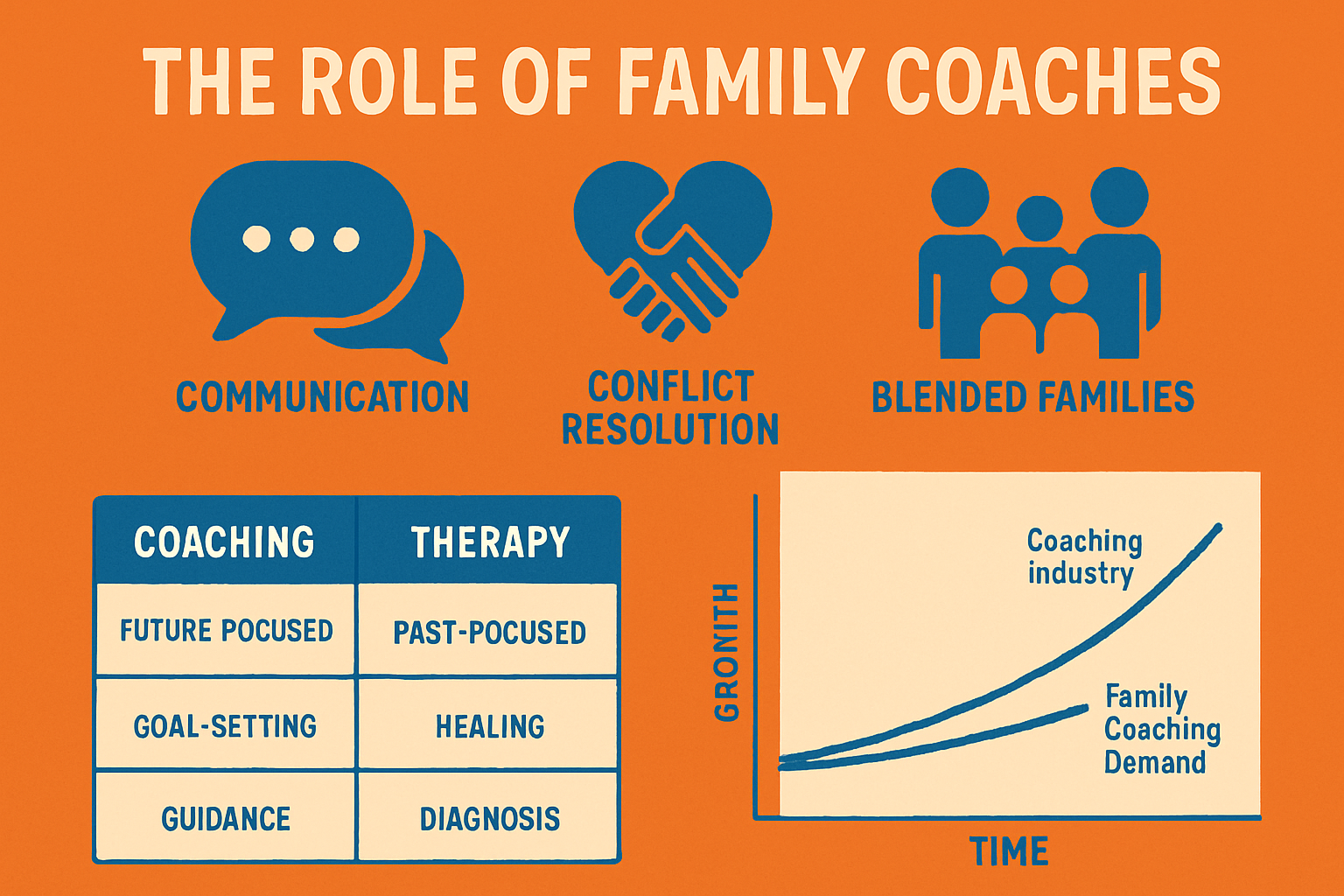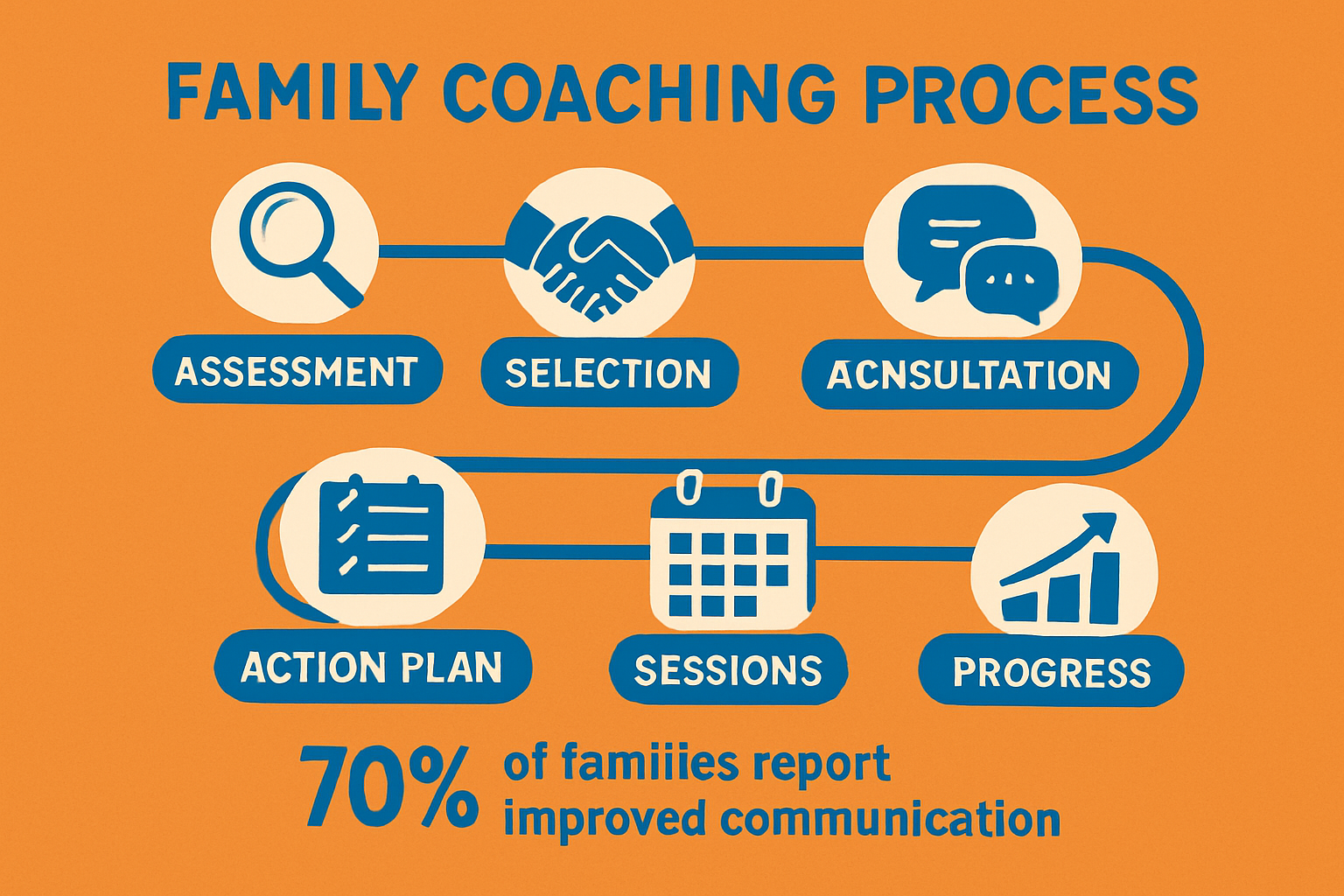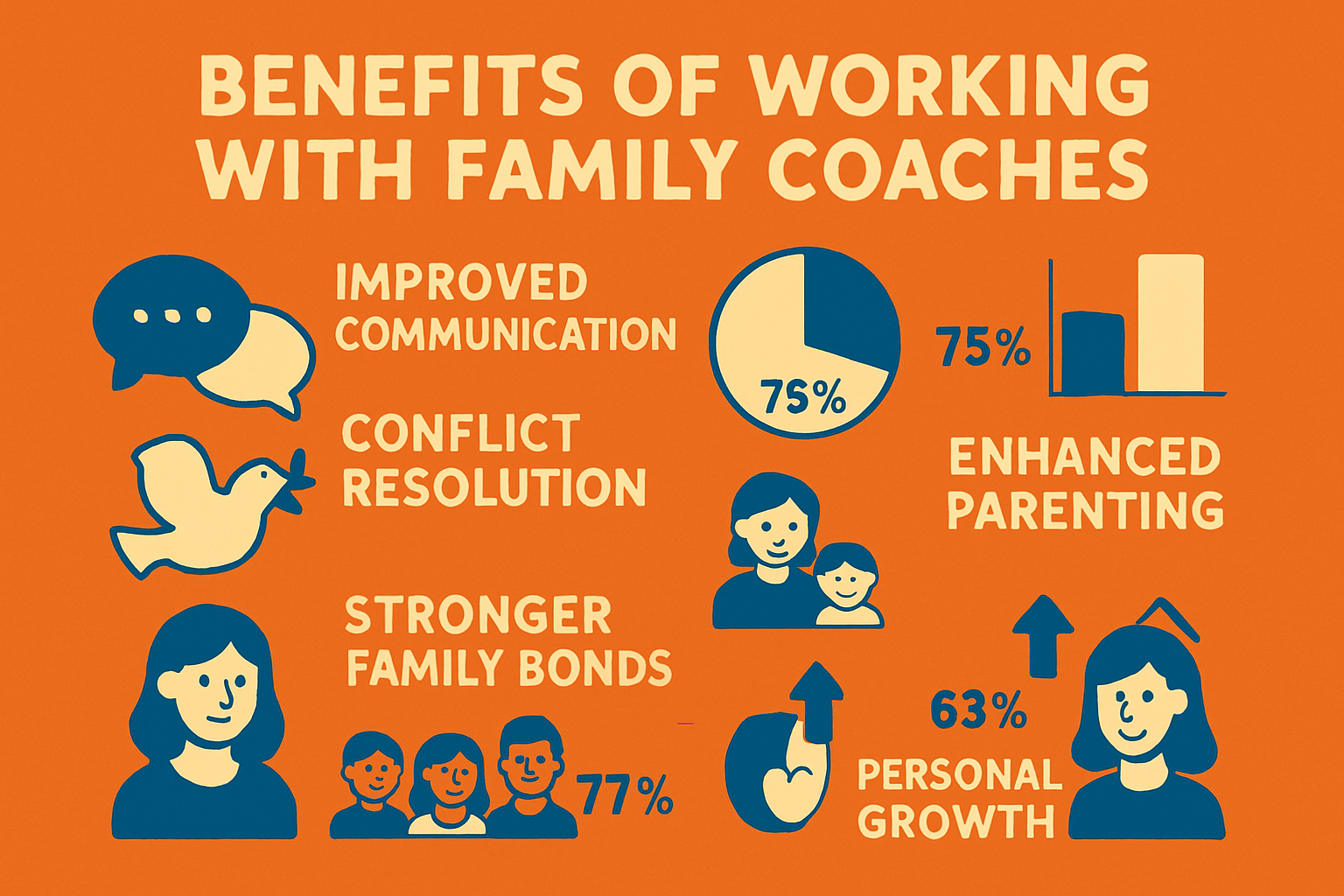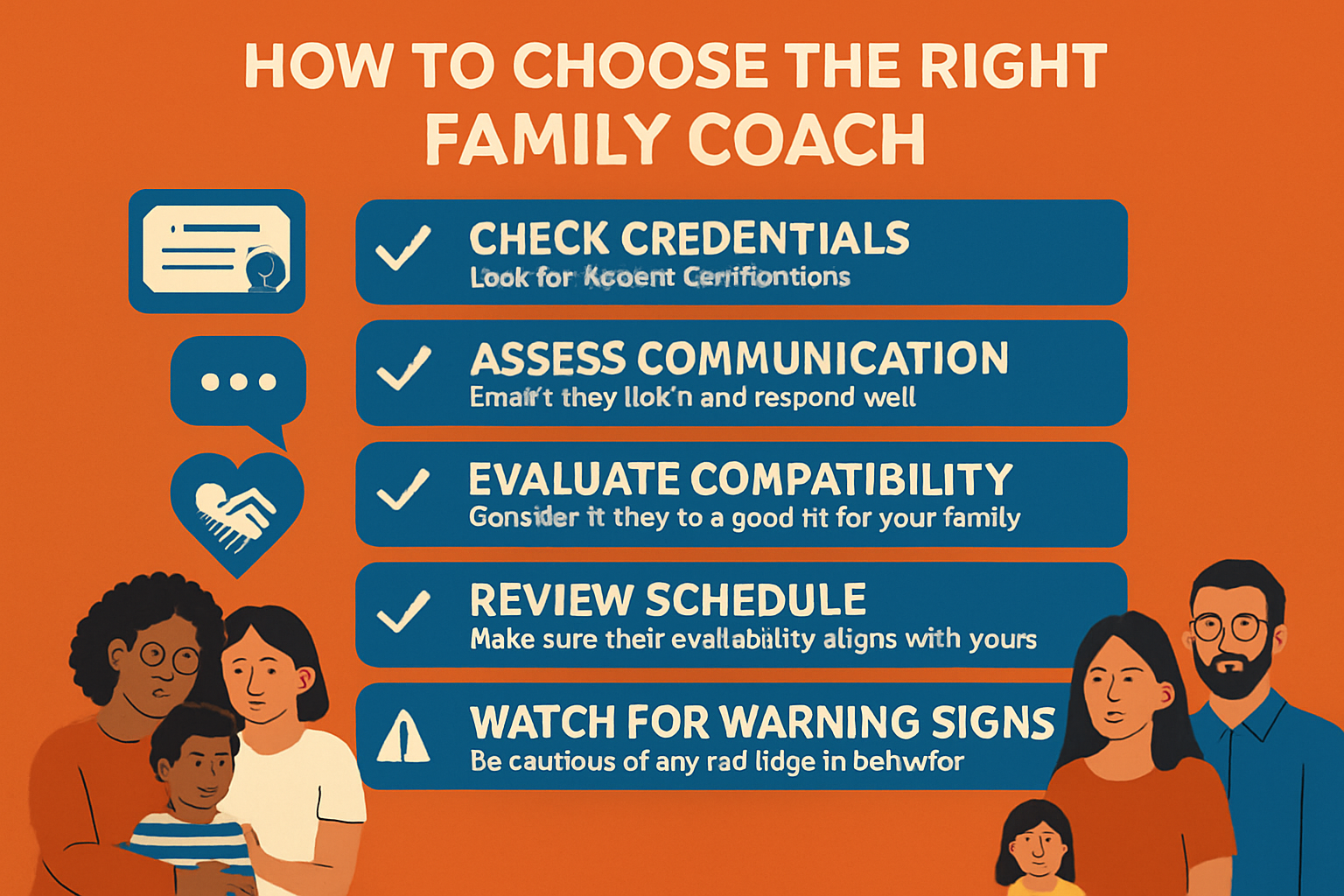Posted on August 15, 2025 by Don Markland
Picture a typical evening in 2025: screens glow in every room, and family members talk less and scroll more. Many families are feeling the strain of digital overload and struggling to connect, leading to misunderstandings and stress. This growing challenge is driving more people to seek the support of family coaches. These professionals offer practical guidance for improving relationships, managing conflict, and building stronger bonds at home. If you’re new to family coaches and curious about how they can help, you’re in the right place WantedDeadorWildGame.com. This guide will walk you through what family coaching is, how it works, how to find the right coach, and the real benefits families experience from working with one.What Is a Family Coach?
Modern families are navigating more complexity than ever, making support from family coaches increasingly valuable. But what exactly do these professionals do, and how do they differ from traditional therapists or counselors? Understanding the unique role of family coaches is the first step toward deciding if this approach fits your family’s needs.
Defining Family Coaching
Family coaching is a collaborative, goal-oriented process designed to help families improve communication, resolve conflicts, and build stronger relationships. Unlike therapy, which often focuses on healing past wounds, family coaches look ahead. They guide families in setting actionable goals and developing practical strategies for everyday challenges. Typical areas of focus for family coaches include:- Communication skills
- Conflict resolution
- Parenting strategies
- Integrating blended families
Key Roles and Responsibilities
Family coaches act as neutral facilitators, helping each family member feel heard and understood. Their main responsibilities include:- Guiding conversations to uncover underlying issues
- Setting clear, achievable goals for the family
- Mediating disagreements to reduce tension
Types of Family Coaches
There are several specializations within family coaching, allowing families to find support tailored to their unique needs. Common types of family coaches include:- Parenting coaches: Help parents develop positive discipline and co-parenting strategies.
- Divorce coaches: Guide families through separation and post-divorce transitions.
- Blended family coaches: Assist in integrating new family members and navigating stepfamily dynamics.
- Adolescent-focused coaches: Address challenges specific to teens, such as communication breakdowns or school stress.
The Difference Between Coaching and Therapy
While both family coaches and therapists support families, their methods and goals differ significantly. Coaching is not mental health treatment. Instead, it emphasizes forward-focused growth and practical problem-solving.| Aspect | Family Coaches | Therapy |
|---|---|---|
| Focus | Future, goals | Past, healing |
| Approach | Action-oriented | Insight-oriented |
| Regulation | Less regulated | Highly regulated |
| Mental Health | Not treatment | Clinical support |
When to Consider a Family Coach
How do you know if your family could benefit from working with family coaches? Look for these common signs:- Ongoing communication issues or persistent conflict
- Major life transitions, such as divorce or blending families
- Difficulty managing parenting responsibilities
- Emotional distance or recurring misunderstandings
How Family Coaching Works: The Step-by-Step Process
Navigating the journey with family coaches involves a clear, supportive process designed to empower every family member. Let’s break down the typical steps so you know exactly what to expect and how each phase supports your family’s growth.
Step 1: Identifying Family Needs
The first step with family coaches is a thorough assessment of your family’s needs. This helps clarify what each person hopes to achieve and where the biggest challenges lie. Coaches often use structured intake forms and guided discussions to uncover patterns and goals. Sample intake questions might include:- What are your family’s main strengths?
- Where do you experience the most conflict?
- What would a successful outcome look like?
Step 2: Finding and Selecting a Family Coach
Once you’ve identified your goals, the next step is to find family coaches who fit your needs. Start by gathering referrals from trusted sources, exploring online directories, or reading reviews. Look for coaches with reputable credentials, such as ICF or IFC certifications. Key criteria to consider:- Experience with similar family dynamics
- Coaching style and approach
- Availability and flexibility
Step 3: The First Consultation
During your initial consultation, family coaches aim to build trust and get to know your family’s story. This session is a safe space to share concerns, ask questions, and clarify expectations. Typical discussion topics include:- Family history and dynamics
- Specific challenges you hope to address
- How coaching sessions are structured
Step 4: Creating a Family Action Plan
After the first meeting, family coaches work with you to develop a tailored action plan. This plan outlines clear, measurable goals and details the steps each family member will take. Elements of an effective action plan:- Weekly check-ins to track progress
- Communication exercises to build understanding
- Assignments or “homework” to practice new skills at home
Step 5: Ongoing Coaching Sessions
With the action plan in place, regular sessions with family coaches keep everyone accountable. Sessions typically last 60 to 90 minutes and may occur weekly or biweekly, depending on your needs. Common coaching tools include:- Role-playing for difficult conversations
- Progress tracking charts
- Reflective homework assignments
Step 6: Measuring Progress and Adjusting Goals
Throughout the process, family coaches focus on measuring outcomes and making adjustments as needed. Success indicators can include improved communication, reduced conflict, and increased confidence in handling challenges. Methods for tracking progress:- Feedback surveys after each session
- Regular reassessment of goals
- Celebrating milestones as a family
Benefits of Working with a Family Coach
Family coaches offer a range of powerful advantages that can transform the way families interact, solve problems, and grow together. Let’s explore the core benefits families experience when they work with family coaches.
Improved Communication and Understanding
Family coaches specialize in helping families break down barriers and build open lines of communication. Through active listening exercises, empathy training, and perspective-taking activities, families learn to express themselves honestly and listen without judgment.- Practice reflective listening during conversations.
- Use “I” statements to share feelings and needs.
- Explore misunderstandings in a safe, neutral space.
Conflict Resolution and Problem-Solving Skills
Disagreements are natural in any family, but unresolved conflict can erode trust and create lasting tension. Family coaches teach practical strategies for managing conflict constructively, from identifying triggers to brainstorming solutions as a team.- Role-play scenarios to practice new responses.
- Set ground rules for respectful discussions.
- Use problem-solving frameworks to address recurring issues.
Enhanced Parenting Approaches
Parenting is a journey filled with challenges and rewards, and family coaches can offer fresh perspectives and evidence-based strategies. They support parents with positive discipline techniques, co-parenting plans, and effective role modeling.- Develop consistent routines for children.
- Address discipline issues collaboratively.
- Foster cooperation between parents and caregivers.
Stronger Family Bonds and Resilience
Building trust and emotional safety is central to the work of family coaches. They help families create rituals, set shared values, and support one another through life’s ups and downs.- Start weekly family check-ins to foster connection.
- Celebrate small successes together.
- Develop coping strategies for stressful times.
Personal Growth for Each Family Member
Family coaches do more than address group dynamics—they also empower each individual to grow. Through self-awareness activities, personal accountability, and goal-setting, every family member is encouraged to reflect and develop.- Set individual goals alongside family goals.
- Practice mindfulness and self-reflection.
- Encourage open sharing of personal experiences.
Choosing the Right Family Coach for Your Needs
Selecting from the many family coaches available in 2025 can feel overwhelming, but the right choice makes all the difference. With so many options, it’s vital to approach this process thoughtfully. Begin by considering the factors that matter most for your family’s unique needs, values, and circumstances.
Credentials and Experience
When evaluating family coaches, always check for professional training and recognized certifications. Reputable coaches are often certified by organizations like the International Coach Federation (ICF) or International Family Coaching (IFC). This background ensures they adhere to ethical guidelines and best practices. Ask potential family coaches about their education, specialties, and years of experience. For instance, a coach with a background in blended family dynamics might be ideal if your family is navigating remarriage. According to a recent U.S. life coaching market analysis, the demand for well-trained family coaches has surged, making credentials more important than ever. Always verify these details before making a decision.Coaching Style and Approach
Every family coach has a unique approach, and matching that style to your family’s preferences is crucial. Some family coaches use a directive style, offering clear guidance and structured plans. Others take a non-directive approach, encouraging families to find their own solutions through reflection and open discussion. Here’s a quick comparison:| Coaching Style | Description | Best For |
|---|---|---|
| Directive | Coach leads, sets clear tasks | Families needing structure |
| Non-directive | Coach facilitates, family leads | Families seeking self-discovery |
Compatibility and Rapport
Trust is the foundation of a successful coaching relationship. It’s essential that all family members feel comfortable and understood by the coach. During initial conversations, pay attention to how the coach listens, communicates, and responds to your concerns. To assess compatibility, consider these questions:- Does the coach make everyone feel heard?
- Are they patient and nonjudgmental?
- Do they respect your family’s values and boundaries?
Logistics: Location, Availability, and Fees
Practical considerations also play a role. Decide whether you prefer in-person sessions or the flexibility of online coaching. Many family coaches now offer virtual or hybrid options, making support more accessible for busy families. Ask about session frequency, duration, and costs. In 2025, average fees for family coaches range from $100 to $250 per hour. Also, check the coach’s availability and how they handle rescheduling or emergencies. These details help ensure that coaching fits seamlessly into your family’s routine.Red Flags and What to Avoid
Not all family coaches are created equal. Watch for warning signs like lack of credentials, promises of instant results, or poor communication. Ethical coaches do not guarantee quick fixes and will be transparent about their qualifications and approach. According to coaching regulatory bodies, it’s wise to avoid coaches who:- Refuse to answer questions about training
- Offer vague or evasive responses
- Lack clear boundaries or confidentiality policies
